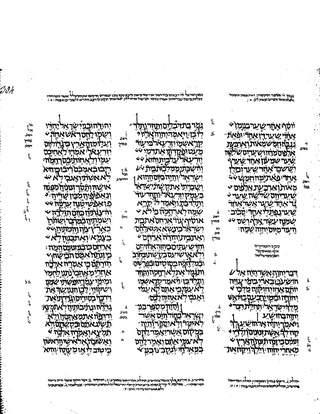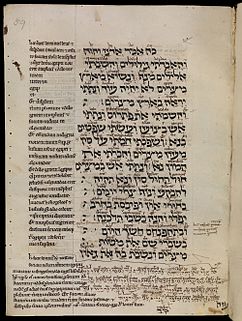
Ezekiel 48 is the forty-eighth chapter of the Book of Ezekiel in the Hebrew Bible or the Old Testament of the Christian Bible. This book contains the prophecies attributed to the prophet/priest Ezekiel, and is one of the Books of the Prophets. Chapters 40-48 give the ideal picture of a new temple. The Jerusalem Bible refers to this section as "the Torah of Ezekiel".

Jeremiah 1 is the first chapter of the Book of Jeremiah in the Hebrew Bible or the Old Testament of the Christian Bible. This book, one of the Nevi'im or Books of the Prophets, contains the prophecies attributed to the prophet Jeremiah. This chapter serves as an introduction to the Book of Jeremiah and relates Jeremiah's calling as a prophet.
Isaiah 62 is the sixty-second chapter of the Book of Isaiah in the Hebrew Bible or the Old Testament of the Christian Bible. This book contains the prophecies attributed to the prophet Isaiah, and is one of the Books of the Prophets. Chapters 56-66 are often referred to as Trito-Isaiah. In chapters 60-62, "three magnificent chapters", the prophet "hails the rising sun of Jerusalem’s prosperity".

Zechariah 2 is the second of the 14 chapters in the Book of Zechariah in the Hebrew Bible or the Old Testament of the Christian Bible. This book contains the prophecies attributed to the prophet Zechariah, and is a part of the Book of the Twelve Minor Prophets. This chapter is a part of a section consisting of Zechariah 1–8. It records the third of eight visions received by the prophet, followed by an oracle calling the exiles to return to the city where Yahweh is about to dwell and all nations will come.

Ezekiel 37 is the thirty-seventh chapter of the Book of Ezekiel in the Hebrew Bible or the Old Testament of the Christian Bible. This book contains the prophecies attributed to the prophet/priest Ezekiel, and is one of the Nevi'im (Prophets). This chapter contains a vision of the resurrection of dry bones, widely known as the Vision of the Valley of Dry Bones, in which Ezekiel at last assures the captives in Babylon that they will return from exile.

Ezekiel 7 is the seventh chapter of the Book of Ezekiel in the Hebrew Bible or the Old Testament of the Christian Bible. This book contains the prophecies attributed to the prophet/priest Ezekiel, and is one of the Books of the Prophets. In this chapter, Ezekiel announces that "judgment on Israel is near".

Ezekiel 5 is the fifth chapter of the Book of Ezekiel in the Hebrew Bible or the Old Testament of the Christian Bible. This book contains the prophecies attributed to the prophet/priest Ezekiel, and is one of the Prophetic Books. This chapter contains the prophecies using the division of the prophet's shaved hair as a sign, showing God's judgment upon Jerusalem, by pestilence, by famine, by the sword, and by dispersion. The siege is described again in chapter 6.

Ezekiel 9 is the ninth chapter of the Book of Ezekiel in the Hebrew Bible or the Old Testament of the Christian Bible. This book contains the prophecies attributed to the prophet/priest Ezekiel, and is one of the Books of the Prophets. This chapter, sub-titled "The Wicked Are Slain" in the New King James Version, contains God's "judgment on the idolaters" who defiled the temple in Jerusalem. Ezekiel's vision of the defiled temple continues as far as Ezekiel 11:25.

Ezekiel 11 is the eleventh chapter of the Book of Ezekiel in the Hebrew Bible or the Old Testament of the Christian Bible. This book contains the prophecies attributed to the prophet/priest Ezekiel, and is one of the Books of the Prophets. In this chapter, Ezekiel pronounces judgment on Jerusalem's "wicked counsellors" and promises that God will restore Israel.

Ezekiel 13 is the thirteenth chapter of the Book of Ezekiel in the Hebrew Bible or the Old Testament of the Christian Bible. This book contains the prophecies attributed to the prophet/priest Ezekiel, and is one of the Books of the Prophets. This chapter contains rebukes against "a variety of false prophets", Ezekiel 13:1-16, and false prophetesses, Ezekiel 13:17-23.

Ezekiel 16 is the sixteenth chapter of the Book of Ezekiel in the Hebrew Bible or the Old Testament of the Christian Bible. This book contains prophecies attributed to the prophet/priest Ezekiel, and is one of the Books of the Prophets. Biblical scholar R. E. Clements calls this chapter "an Old Testament parable of the prodigal daughter", describing a shocking illustration of ungrateful Jerusalem in contrast to God's enduring love to her. This chapter is often linked to Ezekiel 23, which deals with two daughters, symbolizing the Kingdoms of Israel and Judah.

Ezekiel 21 is the twenty-first chapter of the Book of Ezekiel in the Hebrew Bible or the Old Testament of the Christian Bible. This book contains the prophecies attributed to the prophet/priest Ezekiel, and is one of the Books of the Prophets. In chapters 20 to 24 there are "further predictions regarding the fall of Jerusalem", and this chapter also includes a prophecy against the Ammonites.

Ezekiel 23 is the twenty-third chapter of the Book of Ezekiel in the Hebrew Bible or the Old Testament of the Christian Bible. This book contains the prophecies attributed to the prophet/priest Ezekiel, and is one of the Books of the Prophets. This chapter forms part of a series of "predictions regarding the fall of Jerusalem", and is written in the form of a message delivered by God to Ezekiel. It presents an extended metaphor in which Samaria and Jerusalem are compared to sisters named Oholah (Samaria) and Oholibah (Jerusalem), who are the wives of God and accused of "playing the whore" in Egypt then cuckolding her husband while he watched.

Ezekiel 25 is the twenty-fifth chapter of the Book of Ezekiel in the Hebrew Bible or the Old Testament of the Christian Bible. This book contains the prophecies attributed to the prophet/priest Ezekiel, and is one of the Books of the Prophets. This chapter contains the oracles against four nations: Ammon, Moab, Edom, and Philistia. The prophecies of God's vengeance against these and other foreign nations are recorded in other books of the prophets such as Isaiah, Jeremiah and Amos.

Ezekiel 28 is the twenty-eighth chapter of the Book of Ezekiel in the Hebrew Bible or the Old Testament of the Christian Bible. This book contains the prophecies attributed to the prophet/priest Ezekiel, and is one of the Books of the Prophets. This chapter contains a prophecy against the king of Tyre and a prophecy against neighbouring Sidon, concluding with a promise that Israel will be "delivered from the nations".

Ezekiel 31 is the thirty-first chapter of the Book of Ezekiel in the Hebrew Bible or the Old Testament of the Christian Bible. This book contains the prophecies attributed to the prophet/priest Ezekiel, and is one of the Books of the Prophets. In the New King James Version, this chapter is sub-titled "Egypt Cut Down Like a Great Tree".

Ezekiel 34 is the thirty-fourth chapter of the Book of Ezekiel in the Hebrew Bible or the Old Testament of the Christian Bible. This book contains the prophecies attributed to the prophet/priest Ezekiel, and is one of the Books of the Prophets. In this chapter, Ezekiel prophesies against the "irresponsible shepherds" of Israel and states that God will instead seek out God's sheep and become their "true shepherd". The Jerusalem Bible notes the continuity of this theme, occurring in Jeremiah 23:1–6, here in Ezekiel, and later resumed in Zechariah 11:4–17, as well as in the New Testament.

Ezekiel 35 is the thirty-fifth chapter of the Book of Ezekiel in the Hebrew Bible or the Old Testament of the Christian Bible. This book contains the prophecies attributed to the prophet/priest Ezekiel, and is one of the Books of the Prophets. This chapter contains a prophecy against Mount Seir in Edom, to the south of Judah. Biblical commentator Susan Galambush pairs it with an oracle promising "restoration to the mountains of Israel" in the following chapter.

Ezekiel 36 is the thirty-sixth chapter of the Book of Ezekiel in the Hebrew Bible or the Old Testament of the Christian Bible. This book contains the prophecies attributed to the prophet/priest Ezekiel, and is one of the Books of the Prophets. This chapter contains two prophecies, one conveying "hope for the mountains of Israel" and one declaring that Israel's restoration is assured. Biblical commentator Susan Galambush pairs the first of these with an oracle condemning Mount Seir in Edom in the previous chapter.

Ezekiel 44 is the forty-fourth chapter of the Book of Ezekiel in the Hebrew Bible or the Old Testament of the Christian Bible. This book contains the prophecies attributed to the prophet/priest Ezekiel, and is one of the Books of the Prophets. The final section of Ezekiel, chapters 40-48, give the ideal picture of a new temple. The Jerusalem Bible refers to this section as "the Torah of Ezekiel". In particular, chapters 44–46 record various laws governing the rites and personnel of the sanctuary, as a supplement to Ezekiel's vision.







